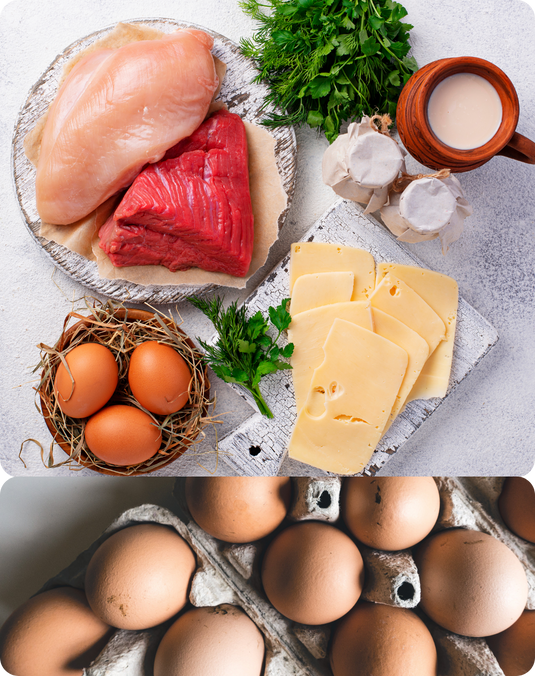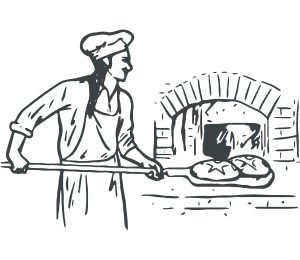- Seed-to-Fork
- Heritage Grains
- Stone-Milled
- Clean
- Regenerative
- Seed-to-Fork
- Heritage Grains
- Stone-Milled
- Clean
- Regenerative
-
Heritage & Ancient Grains
Chemical Free
GMO Free
Build Your Own Flour Box Build Your Own Flour Box
Regular price $125.00$125.00 Regular priceUnit price per -
Heritage Grain
Chemical Free
GMO Free
Rouge de Bordeaux Wheat Flour Rouge de Bordeaux Wheat Flour
5 lb
Regular price $38.53$38.53 Regular priceUnit price per -
Heritage Grain
Chemical Free
GMO Free
Turkey Red Wheat Flour Turkey Red Wheat Flour
5 lb
Regular price $37.38$37.38 Regular priceUnit price per -
Ancient Grain
Chemical Free
GMO Free
5 lb
Regular price $36.80$36.80 Regular priceUnit price per -
Ancient Grain
Chemical Free
GMO Free
5 lb
Regular price $40.25$40.25 Regular priceUnit price per -
Ancient Grain
Chemical Free
GMO Free
5 lb
Regular price $37.95$37.95 Regular priceUnit price per -
Heritage Grain
Chemical Free
GMO Free
Heritage Bread Flour Blend Heritage Bread Flour Blend
5 lb
Regular price $24.14$24.14 Regular priceUnit price per
Frequently Asked Questions
What makes Nourish Flour different?
⦁ Ancient and heritage grains: never genetically manipulated, more flavorful, and easier to digest
⦁ Full transparency: we know who grows the grains, we don’t just buy it randomly off the market like most flour brands
⦁ Regeneratively grown: healthier soil, cleaner environment, healthier ecosystem, and more nutrient-dense flour
⦁ Freshly milled: stone-milled just 48 hours before it ships to your door for peak nutrition and flavor
⦁ Traditional stone-milled: unlike modern roller mills that strip away nutrients, stone-milling preserves the grain’s natural vitamins, minerals, oils, and aroma
⦁ Never bleached
⦁ Never bromated
⦁ Lab-tested pesticide free
⦁ No synthetic fortification: no iron shards, no artificial vitamins, just pure flour the way nature intended
⦁ Beyond Organic: there are a number of loop holes in the Organic industry so we don’t trust or bother with that expensive certification. In fact, Organic farming practices often Our farming requirements go beyond what Organic requires, providing more transparency
⦁ Truly nutrient dense
⦁ Bagged in 100% cotton
This is flour you can feel GOOD about using.
Process flow for Nourish flour:
1️⃣ Heritage wheat and ancient grains grown by our regenerative row crop farmers
2️⃣ Flour is milled fresh every week for maximal nutrients and improved taste
3️⃣ Flour is bagged in cotton
4️⃣ Shipped within 2-3 days of milling directly to your door
Fresh, maximal nutrients, convenience - the Nourish way
Voting with Your Dollar
By choosing Nourish Flour, you’re saying no to the chemical-intensive, industrial agriculture system that depletes topsoil and pollutes our environment….
And YES to regenerative practices that rebuild soil, increase food nutrient density, and reduce pesticide exposure for families and communities.
This is how we change the food system, one food purchase at a time.

How do I use each of the flours?
Our flours are freshly milled from heritage and ancient grains, so they behave differently than modern, highly processed flours.
Here is a link to a more detailed description of the uses for each flour, with linked recipes.
But here’s a quick guide to help you get the best results:
⦁ Rouge de Bordeaux & Turkey Red (wheat flours): Great for breads, pastries, and pizza dough. They have a slightly lower gluten strength than modern flours, so doughs may rise a bit slower and be a little more dense than modern wheat. Use slightly more kneading and allow time for the dough to rest.
⦁ Spelt: It has a more delicate gluten structure, but works well in quick-rise or enriched breads, muffins, pancakes, and cookies. Avoid over-kneading, and you may need slightly less liquid than a recipe calls for with conventional flour.
⦁ Rye: Perfect for dense, flavorful breads like classic rye or add some to your sourdough mix. Rye flour doesn’t rise as much as wheat flours, so it’s often combined with other flours. It adds a rich, earthy taste and keeps baked goods moist longer.
⦁ Millet: Gluten-free and light, millet flour is excellent for pancakes, flatbreads, muffins, and cookies. Because it lacks gluten, it works best in combination with other flours or with binding agents (like eggs) in recipes that need structure.
Each flour’s flavor and hydration needs are unique, but the results are richer, more flavorful, and more nutrient-dense than modern flours.
Is your flour Organic?
No, and that’s intentional. There are many loopholes in the Organic certification system, so we don’t rely on it or spend money on the label. In fact, you can watch me dive deeper into this and why we intentionally avoid the Organic label in my YouTube video.
Organic farming practices can sometimes be degenerative, using heavy tillage that degrades soil health over time. Our standards go beyond Organic, ensuring full transparency with our group of regenerative row crop farmers.
We never use toxic pesticides, and we have the lab results to prove it. Tested by an independent third-party lab, Safe Food Alliance, our flour is pesticide-free, screened for over 750 pesticides.

What does ‘ancient and heritage grain’ mean?
Our ancestors have thrived on flour and bread for thousands of years. Now, it’s making people sick. What changed?
Modern wheat is…
⦁ genetically altered
⦁ often coated with pesticides
⦁ stripped of natural nutrients during harsh milling
⦁ bleached and bromated
⦁ fortified with iron shards and synthetic vitamins like folic acid.
Unlike today’s hybridized and genetically manipulated wheat, ancient and heritage grains are…
⦁ easier to digest
⦁ contain more vitamins and minerals
⦁ are NOT fortified with synthetic vitamins and minerals
⦁ and are free from genetic modification.
Many people who struggle with modern wheat find ancient and heritage grains gentler on the gut. These grains also offer a deeper, more complex flavor and superior baking qualities compared to conventional wheat.
“Ancient grains” refers to grains that have remained largely unchanged for thousands of years. At Nourish, we offer spelt and millet ancient grains.
“Heritage grains” (sometimes called heirloom grains) refer to older grain varieties that were grown before industrialized agriculture and modern hybridization, but they don’t have to be thousands of years old like ancient grains. The are typically regionally adapted and grown and passed down through generations. At Nourish, we offer Turkey Red wheat and Rouge de Bordeaux wheat, both are heritage grains with long traditions in food cultures.
Ancient and heritage grains preserve the integrity of wheat as nature intended, before modern industrial breeding altered its genetics.
Is your flour fresh?
Yes, many mills mass-produce flour bags that site in warehouses for months. This leads to nutrient degradation and oxidation. Our flour bags are milled each week and shipped out of our hub 48 hours after the flour has been milled and bagged.
> Flour milled on Sunday
> Shipped out of our hub on Monday or Tuesday
Is your flour fortified?
Absolutely not.
(And for context, most modern flour is. You’ll know if you read an ingredient label and see: “Enriched Flour” or a list like: wheat flour, niacin, iron, thiamin mononitrate, riboflavin, folic acid.)
Modern flour is processed so aggressively that it strips away many of the naturally occurring vitamins and minerals. Then companies try to “fix” this by adding synthetic nutrients back in.
But it’s unrealistic to think we can recreate nature’s design with isolated additives that lack the same bioavailability or synergy.
Here’s what enrichment typically includes:
⦁ Metallic Iron Particles: Conventional enriched flour often contains reduced iron—essentially tiny metal filings. These can contribute to iron overload and oxidative stress in susceptible individuals.
⦁ Synthetic B Vitamins: Instead of the complex, naturally occurring B vitamins found in whole foods, enriched flours use synthetic forms like folic acid. Folic acid must be converted in the body to its active form (tetrahydrofolate). Not everyone performs this conversion efficiently, leaving unmetabolized folic acid circulating in the bloodstream: something that may disrupt natural folate pathways and overall B vitamin metabolism.
At Nourish Food Club, our Non-Fortified Flour keeps its natural nutrient profile intact: free from synthetic additives, industrial iron, and artificial “enrichment.”
We honor the integrity of real food so you get flour as nature intended: rich in genuine vitamins, minerals, and incredible flavor.
Is your flour bromated?
Absolutely not.
What does ‘bromate’ mean? Many conventional flours and baked goods in the U.S. contain potassium bromate: a flour treatment agent used to strengthen dough and promote higher rises. However, this chemical additive has been classified as a possible human carcinogen and is banned in numerous countries, including the European Union, Canada, and the United Kingdom, due to concerns about its potential link to cancer and oxidative damage.
Despite these risks, potassium bromate remains legal in the U.S., where it is often used in mass-produced breads, pizza dough, and other baked goods. Studies suggest that residual bromate can remain in finished products, posing unnecessary health risks.
At Nourish, we take a stand against harmful additives. Our flour is 100% free of potassium bromate, ensuring you get pure, high-quality flour without unnecessary chemical enhancers. We believe real food should be made with real ingredients, just as nature intended.
How is your flour grown?
Our chemical-free heritage and ancient grains are grown using regenerative agriculture practices that work with nature, not against it. That means no pesticides and no heavy tillage.
Instead, our farmers rely on time-honored, soil-building practices such as:
⦁ Diverse crop rotations that break pest cycles naturally
⦁ Cover crops to protect and feed the soil
⦁ Working with the seasons rather than forcing artificial growth
⦁ Living roots in the ground as much as possible to support microbial life
By choosing Nourish Flour, you’re voting with your dollar against the chemical-intensive, industrial agriculture system that depletes topsoil and pollutes our environment.
You’re instead supporting regenerative agriculture, which restores soil health, boosts nutrient density and flavor in food, and reduces pesticide exposure in our environment.
How is your flour milled?
Once harvested, grains must be milled to transform them into flour. While modern roller mills dominate industrial flour production, we choose the time-honored method of stone milling to preserve the integrity of the grain.
Stone milling is a traditional, slower grinding process that crushes whole grains between two large natural or engineered stones. Unlike high-speed roller mills, which strip away the bran and germ to create ultra-refined flour, stone milling preserves more of the grain’s natural vitamins, minerals, and polyphenols, delivering a flour that is not only more nutritious but also richer in flavor.
Because stone mills generate less heat, delicate nutrients remain intact, and the resulting flour retains a coarser texture with more depth and character.
Many bakers and home cooks find that stone-milled flour produces superior-tasting sourdough bread and other baked goods with a heartier, more satisfying bite.
At Nourish, we are committed to milling methods that respect both tradition and nutrition, ensuring that our flour delivers the highest quality in both taste and nourishment.
Meet your flour miller, Dustin! And the set up used to stone-mill and bag your flour in 100% cotton bags.

How do I store the flour?
Our flour is different from the heavily processed flour you’ll find at the store. Because it’s freshly milled from whole grains, we recommend storing it in the freezer to keep your flour super fresh.
Why? Freezing helps:
⦁ Preserve freshness & flavor: Keeps the natural oils from turning rancid.
⦁ Maintain nutrients: Protects vitamins and essential fatty acids naturally found in whole grains.
⦁ Prevent pests: Eliminates any risk of pantry pests like weevils.
⦁ Extend shelf life: Freshly milled flour can last months in the freezer instead of just weeks at room temperature.
Tip: Keep it in an airtight container or heavy-duty freezer bag, and bring it to room temperature before baking for best results.













